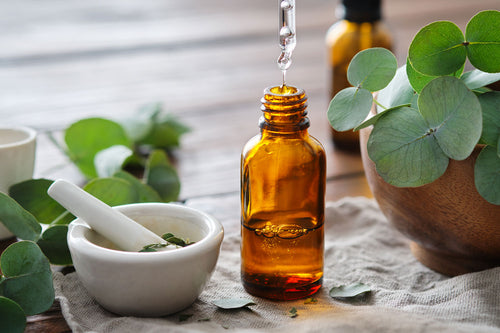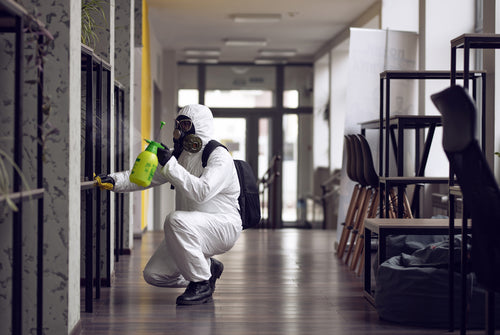Everyone's house goes through phases with different types of odors. But before you add air fresheners to your shopping list, there are a few things you should know. Home odors are common, and their presence doesn't necessarily indicate a lack of cleanliness on your part. However, bad smells aren't meaningless; they often emanate from sources that require your attention and could indicate the presence of toxins and bacteria.
Although an air freshener may temporarily cover up a bad smell in your home, their sweet smells won't last. Additionally, they could hamper your ability to find the origin of the bad smell. Unfortunately, that's not the end of their downsides — many air fresheners contain dangerous chemical solutions that degrade indoor air quality.
Air fresheners may smell like the most pungent flowers ever picked, but their smells aren't natural. They contain chemical-laden solutions that could harm your health. Keep reading to learn about how air fresheners worsen indoor air quality and why natural alternatives and high-quality air purifiers are a better choice.
Ready to ditch the bad smells and improve your home's air quality? Air Oasis is here to help. Remove odors, toxins and more with our top-of-the-line purification technology.
Indoor Air Quality
If you've ever scoffed at someone for stepping outside to get a “breath of fresh air,” you may want to prepare your apology. It turns out there's a good reason to take a break from indoor air, namely the fact that indoor air is often polluted.
According to the Environmental Protection Agency (EPA), indoor air quality can be more polluted than outdoor air quality in even the largest, most industrial cities. Indoor air is often rife with harmful pollutants, including the following:
- Asbestos
- Biological pollutants
- Carbon monoxide and nitrogen dioxide
- Indoor particulate matter
- Pesticides
- Fuel-burning combustion
- VOCs
The World Health Organization (WHO) estimates that 3.8 million people a year die prematurely from illness caused by indoor air pollution. Illnesses attributable to poor indoor air quality include pneumonia, stroke, ischaemic heart disease, chronic obstructive pulmonary disease (COPD) and lung cancer.
How Do Air Fresheners Affect Indoor Air Quality?
Air fresheners may add hazardous pollutants to the air, which negatively impacts indoor air quality. UMass Amherst department of Environmental Health and Safety produced a fact sheet about air fresheners in relation to human health and indoor air quality.
Here are some of the facts that people may be unaware of:
- Air fresheners are associated with elevated levels of volatile organic compounds.
- Exposure to air pollutants from air fresheners has been linked to adverse health effects including migraines, asthma attacks, and dermatitis.
- "Green" air fresheners still emit potentially hazardous chemicals because there is a lack of regulatory definitions surrounding these terms when it comes to air fresheners.
What Are VOCs?
Volatile organic compounds (VOCs) are a large group of chemicals found in many products used to build and maintain homes. Once in the home, these products off-gas VOCs into the air, worsening air quality and endangering the home's occupants. Unfortunately, many commercially available air fresheners emit a steady stream of VOCs.
Benzene, ethylene glycol, formaldehyde, methylene chloride, tetrachloroethylene, toluene and xylene are VOCs commonly found in the home. Many building materials, personal care and home products contain VOCs, including the following:
- Paints, varnishes and adhesives
- Carpet, upholstery, vinyl flooring, foam
- Composite wood products
- Air fresheners, cleaning products
- Cosmetics
- Fuel oil, gasoline
VOCs are among the largest contributors to indoor air pollution, and in addition to causing illness, they can actually react with other elements in the air to form pollutants like formaldehyde.
Concerned about VOCs in your home? Luckily, you do have options. One of the best ways to improve your indoor air quality is by running a top-of-the-line air purifier for VOCs.
Air Fresheners and VOCs
Results from numerous studies suggest that air fresheners are a significant source of VOCs and contribute to indoor air pollution. In a 2015 study, researchers found that air fresheners can increase indoor levels of terpenes, xylenes, aldehydes and esters — all of which can be toxic in high concentrations.
Researchers also found that certain constituents in air fresheners may react with ozone to create secondary pollutants like formaldehyde, secondary organic aerosol, oxidative product and ultrafine particles. These pollutants are known to negatively affect human health by damaging the central nervous system, altering hormones and more.
Evidence suggests that many air fresheners contain harmful VOCs that are not indicated in their product descriptions. A 2019 study revealed that of four randomly selected, mid-price air fresheners, each one contained potentially harmful chemicals not listed on the product label. Instead, each air freshener listed ambiguous constituents like “fragrance” and “parfum” that were not described. Researchers note that manufacturers are not legally obligated to reveal all of a product's ingredients and suggest future policy should require a full list of synthetic chemicals used.
Unfortunately, the public is largely unaware that many fragranced products — even ones labeled as “green” and “organic” — emit VOCs. More than two-thirds of people surveyed in a 2016 study didn't know that fragranced products emit VOCs, and 60% said they wouldn't have used them if they'd known. Additionally, the study's findings suggest that more than 50% of the U.S. population would prefer that workplaces, health care facilities and professionals, hotels, and airplanes were fragrance-free.
Natural Alternatives to Air Fresheners
When considering the health risks, air fresheners just aren't worth it. Luckily, there are many viable alternatives. Homeowners can freshen the smell of their home without sacrificing indoor air quality by trying one of these natural air fresheners:
- Stovetop potpourri: a sweet-smelling pot of aromatic ingredients. Simply add ingredients like lemon and rosemary or cinnamon and cranberries to a pot of water, bring to a boil and let simmer. The smell will fill your home for hours.
- Indoor herb garden: the perfect addition to the kitchen, bathroom or any other window-lit room in your home. Most herbs only require low light and are relatively easy to grow. Fill your home with the smell of herbs like basil, cilantro, rosemary and sage and enjoy the added cooking benefits.
- Homemade reed diffuser: an ideal odor solution for the essential oil enthusiast. Simply find a glass or ceramic container with an open top and add essential oils and a base like almond or safflower oil. Insert rattan reeds or bamboo skewers and you've got an aesthetically pleasing essential oil diffuser.
- Homemade essential oil spray: about a cup of water, a pinch of baking soda and your favorite essential oils. After combining these ingredients, pour them into a spray bottle for easy application around the home.
Additionally, homeowners can improve their indoor air quality and reduce bad smells by emptying the garbage frequently and opening their windows and doors for ventilation. Fresh flowers and houseplants are also great options, as long as none of the home's occupants are allergic.
How to Improve Indoor Air Quality
There's more to improving indoor air quality than reducing bad smells. The examples above are alternatives to using air fresheners, but there are plenty of other steps people can take to get fresher air indoors. In a previous post, we covered 10 steps to improve air quality in 2023. Some of the key takeaways include monitoring humidity levels, changing the air filters in your HVAC systems, getting rid of cleaning supplies correctly, and keeping pets groomed to reduce dander. Of course, adding a quality air purifier in the home provides additional benefits.
Air Purifiers for Odors
Indoor air pollution is a major public health concern with a vast range of implications. To completely eliminate VOCs from the home is a lofty and potentially unrealistic goal for most homeowners, as VOCs exist in walls, floors, ceilings and insulation. Luckily, a high-quality air purifier can eliminate VOCs from the air while leaving your home intact.
Interested in buying the best air purifier on the market? Look no further than Air Oasis. At Air Oasis, we take the science of air purification seriously, which is why we conduct rigorous research and have our purifiers evaluated at third-party labs. If you're ready to improve your home's air quality and get rid of bad smells, consider buying one of our high quality air purifiers. Questions? Reach out to us online or give us a call at (806) 373-7788.



